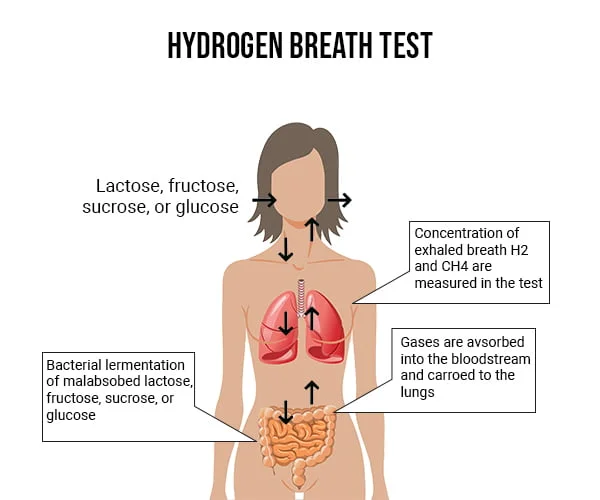Performed in our offices in Union Square/Chelsea, Midtown, Financial District, and the Upper East Side, NY, a hydrogen breath test uses the measurement of hydrogen in the breath to confirm or rule out conditions such as bacterial overgrowth or intolerance to certain sugars. Our mission is to provide safe and effective therapies in a warm and welcoming environment.
What is a hydrogen breath test?
A hydrogen breath test is a test that uses the measurement of hydrogen in the breath to diagnose several conditions that cause gastrointestinal symptoms. These include:
- Lactose Intolerance
- Fructose Intolerance
- Sucrose Intolerance
- Small Intestinal Bacterial Overgrowth (SIBO)

Hydrogen breath tests are now available at Manhattan Gastroenterology to help us distinguish some causes of the common gastrointestinal symptoms. These tests are useful to diagnose lactose intolerance, fructose intolerance, sucrose intolerance, and small intestinal bacterial overgrowth (SIBO). SIBO affects the small intestine and occurs when bacteria that normally grow in the colon begin to grow in massive amounts in the small intestine.
By simply testing the breath of our patients after ingesting certain substances, we can help diagnose these conditions, which may be triggers for their symptoms.
How do I prepare for a hydrogen breath test?
Prepping for a hydrogen breath test is not like a bowel prep for a colonoscopy. We will provide you with specific instructions for preparing for the test, which will include but isn’t limited to eating a low carbohydrate diet for some time. This diet aims to avoid foods that may produce gas in the intestinal tract, which could cause inaccurate test results.
Patients with recent diarrheal episodes, a recent colon prep, or recent antibiotic use may need to postpone their test. Our team will provide you with a more detailed explanation of the test preparation, which will mostly focus on your diet before the test. We can also demonstrate the test so that you may do it at home more easily.
What can I expect from a hydrogen breath test?
This test requires that you drink a solution of lactose, fructose, sucrose, or glucose in water. We will ask you to breathe into a plastic bag when you have finished drinking the solution. We obtain breath samples at specific time intervals depending on what we are testing for. The breath sample will be analyzed for hydrogen content to determine if you can properly break down the lactose, fructose or sucrose, or if you have bacterial overgrowth.
★ ★ ★ ★ ★The entire staff was welcoming and made the visit quick and seamless. The office is clean, and the staff even make a point in offering coffee or water while you wait. The doctor was very friendly and to the point. Highly recommend choosing this office.
What Are the Limitations of Hydrogen Breath Testing?
Most experts agree that breath testing is a simple, non-invasive, and widely available testing modality for unraveling symptoms that are frequently difficult to explain. It does, however, have several limitations.
The presence of hydrogen-producing bacteria is necessary for the hydrogen breath test. Some people, however, may have an overgrowth of methane-producing bacteria, making hydrogen breath testing impossible. Although methane can be measured in the breath in the same way as hydrogen, there is far less experience with it, and its production is more complex.
False-positive and false-negative results may arise due to rapid transit (food passing too quickly through the digestive system), delayed gastric emptying (food moving too slowly through the gut), bacteria in your mouth, or failure to follow the recommended low-fiber diet the day before the test.
Are There Any Side Effects Associated with Hydrogen Breath Testing?
Hydrogen breath testing is harmless and completely safe. In some cases, symptoms like diarrhea, bloating, abdominal cramping, or gas can occur in patients with poor absorption of carbohydrates and sugars. These typically appear during or immediately after the procedure and resolve within a day or two. Because we use a small lactose dose for testing, the incidence of any symptoms when being tested for lactose is unlikely.
Important Reminder: The only intent of this information is to provide guidance, not definitive medical advice. Please consult a doctor about your specific condition. Only trained, experienced board-certified GI doctors like our doctors can determine an accurate diagnosis and proper treatment.
For more information about the conditions we treat or to schedule a consultation with one of our doctors, please contact our NYC office. We offer the most comprehensive hydrogen breath tests in NYC.
